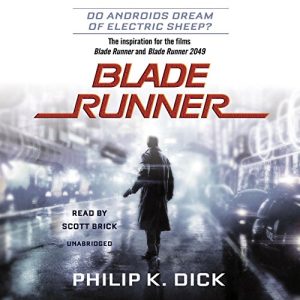Blade Runner Audiobook: Dreaming of Electric Sheep in a Dystopian Soundscape
It was a gray morning when I pressed play on Blade Runner Audiobook, narrated by the ever-talented Scott Brick. The air outside my window felt heavy, as if it mirrored the weight of a world teetering on the edge of collapse – much like Philip K. Dick’s haunting vision of Earth in 2021. I’d been craving a story that could pull me into its depths, one that blurred the lines between humanity and machinery, morality and survival. What I didn’t expect was an audiobook that would make me question not only the world it painted but also my own perception of empathy and existence.
—
The first thing that struck me about Blade Runner Audiobook was Scott Brick’s voice – a perfect balance of grit and precision. His narration doesn’t just tell the story; it inhabits it. Brick breathes life into Rick Deckard, the bounty hunter tasked with retiring rogue androids, while capturing the nuanced melancholy of a man navigating a crumbling society. His tonal shifts – subtle yet effective – bring out the despair in Deckard’s introspection, the cold cunning of Rachael Rosen, and even the eerie stillness of the Nexus-6 androids. It felt as though Brick had plucked each character from Dick’s pages and given them distinct voices that stayed with me long after I’d hit pause.
Philip K. Dick’s storytelling is nothing short of prophetic. Published decades ago, Do Androids Dream of Electric Sheep? (the novel on which this audiobook is based) eerily mirrors contemporary questions about artificial intelligence, environmental decay, and what it means to be human. In this bleak future, owning a real animal is a status symbol because most species have gone extinct – a chilling parallel to today’s climate concerns. Through Deckard’s pursuit of fugitive androids, Dick forces us to confront uncomfortable truths: Can machines possess souls? Are humans inherently more moral than their creations? And what does it mean to feel empathy in a world stripped bare?
One particularly poignant moment comes when Deckard encounters Luba Luft, an opera-singing android whose artistry seems more human than some actual humans in this world. Her plea for life is both chilling and heartbreaking, and through Brick’s narration, her fear felt visceral – almost too real. I found myself torn between rooting for Deckard to complete his mission and wanting him to abandon it altogether. That tension speaks volumes about Dick’s ability to craft morally ambiguous characters who reflect our own inner conflicts.
But what truly elevates this audiobook experience is its layered exploration of empathy – a theme that resonates deeply with me as someone who has always been fascinated by stories exploring humanity’s darker corners. As Deckard administers the Voigt-Kampff test (a tool designed to distinguish humans from androids based on emotional responses), I couldn’t help but wonder: Would I pass? The test itself becomes less about determining who is real and more about revealing how fractured humanity has become in its obsession with hierarchy and control.
Equally compelling are the subplots involving J.R. Isidore, a special (a human genetically damaged by radiation) who befriends Pris Stratton, one of the fugitive androids hiding from Deckard. Isidore’s loneliness echoes through every word he speaks, making his interactions with Pris feel achingly intimate yet tinged with inevitable betrayal. His yearning for connection reminded me that even in a dystopia populated by machines, it is our capacity – or incapacity – for empathy that defines us.
The soundscape crafted in Blade Runner Audiobook deserves special mention as well. While there isn’t an elaborate musical score or sound effects typical of some audiobooks, Brick’s measured pacing creates an atmosphere so immersive you can almost hear the hum of decaying cities or feel the desolation wafting off irradiated wastelands.
—
As I reached the final chapters, my mind swirled with questions far beyond those posed by the narrative itself: What happens when we blur the boundaries between creator and creation? Are we destined to destroy ourselves – or will we find redemption in something as simple as caring for another being? The discovery of an electric toad at the end encapsulates these existential musings beautifully – a bittersweet reminder that hope can exist even in artificial forms.
For anyone hesitant about diving into this audiobook because they’ve already seen Ridley Scott’s iconic Blade Runner film adaptation or its sequel Blade Runner 2049, let me assure you: This is an entirely different beast. While both mediums share thematic DNA, Philip K. Dick’s original work digs deeper into philosophical territory that only audiobooks like this can amplify through tone and voice.
—
If you’re ready to lose yourself in a dystopian masterpiece brought vividly to life by Scott Brick’s compelling narration, then Blade Runner Audiobook awaits you at [Audiobooks4soul.com](https://Audiobooks4soul.com). It’s not just a listening experience – it’s an emotional odyssey through questions we might not want answered but desperately need to ask.
Looking forward to our next foray into storyscapes together! Until then… happy listening.
Stephen











